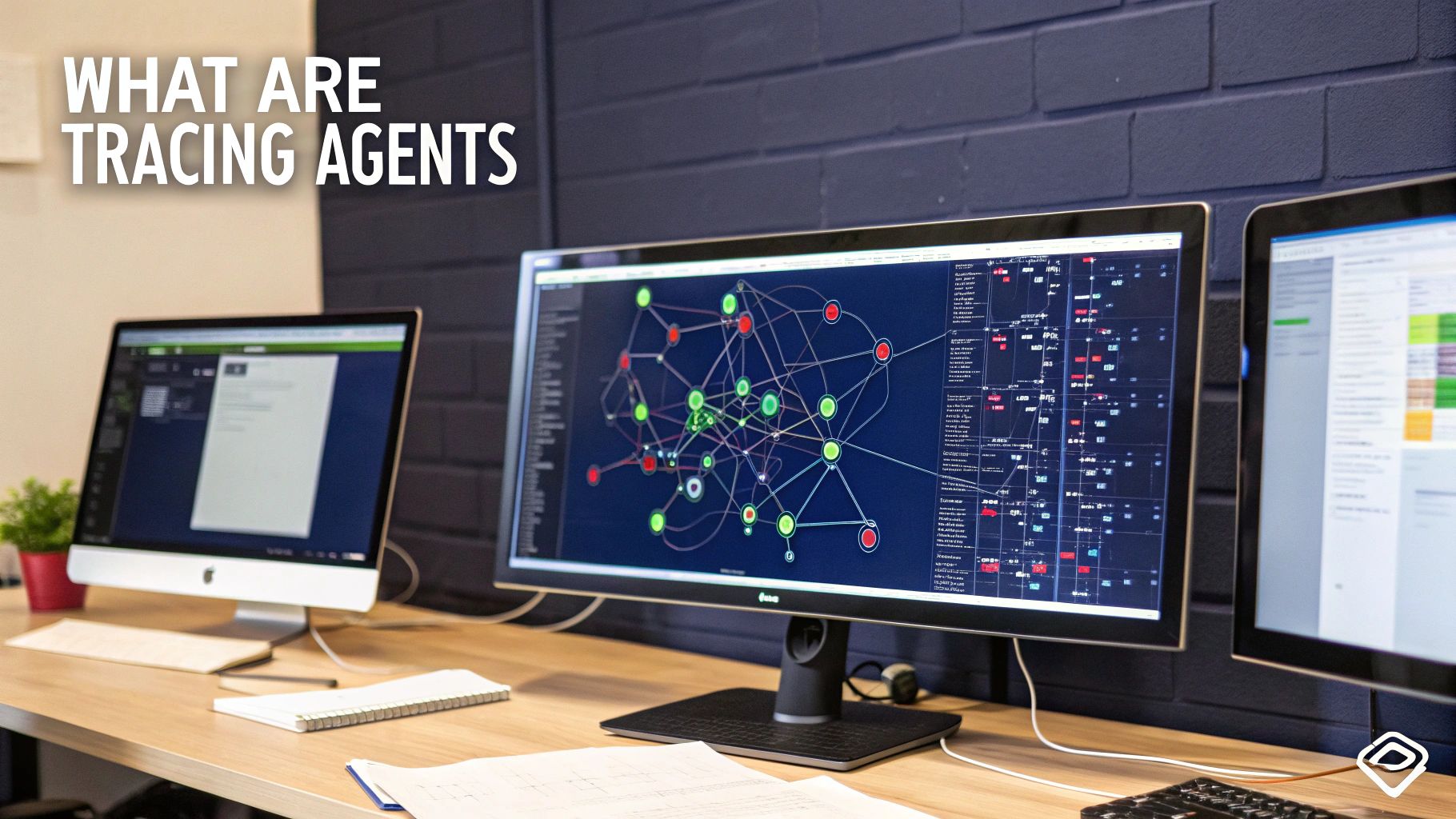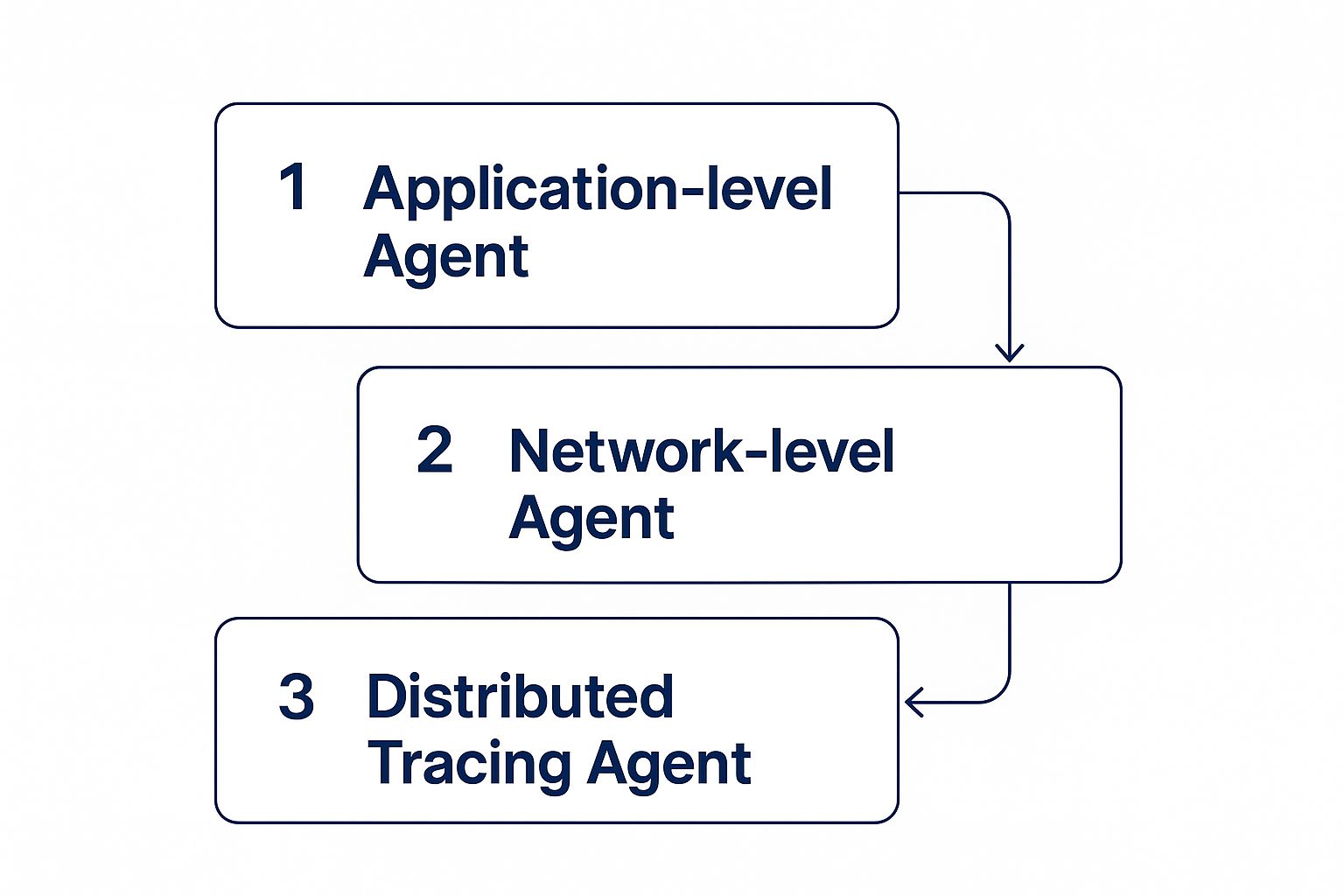How Tracing Agents Work: Inside Professional People Finding
- Showix technical Team
- Jun 12, 2025
- 12 min read
Updated: Jul 28, 2025
Behind The Curtain: What Tracing Agents Actually Do
Forget the Hollywood image of tracing agents burning rubber in a high-speed chase. The reality is far more grounded, focusing on meticulous research, digital sleuthing, and a firm grasp of data privacy laws. Think of a detective, not with a magnifying glass, but with specialised databases at their fingertips and the know-how to interpret digital breadcrumbs. That's much closer to the real work of tracing agents in the UK today.
Tracing agents employ a range of techniques to locate individuals, often starting with the information a client provides. This could be anything from a name and former address to an old phone number or social media handle.
They then weave together online resources, public records, and specialised databases to reconstruct the puzzle of someone's current location. This process demands a sharp eye for detail and the skill to link seemingly disparate pieces of information.

This screenshot from Data Trace UK illustrates the diverse services tracing agents offer. It showcases the scope of their expertise, encompassing everything from individual searches to complex corporate investigations. The range of services highlights the adaptability needed in this profession.
Understanding the Spectrum of Tracing Services
The UK tracing industry offers a spectrum of services, from simple automated searches to in-depth desktop investigations. Let's take a closer look at the different types of services available.
To help illustrate this, the following table compares different levels of tracing services, ranging from basic automated searches to comprehensive investigations.
Service Type | Complexity Level | Typical Use Cases | Average Timeframe |
|---|---|---|---|
Basic Automated Search | Low | Locating individuals with readily available information | A few days |
Standard Desktop Investigation | Medium | Tracing individuals with limited information or requiring more in-depth research | 1-2 weeks |
Comprehensive Investigation | High | Complex cases involving missing persons, asset tracing, or intricate background checks | Several weeks or more |
As you can see, the complexity, use cases, and timeframe can vary significantly based on the specific service required. Choosing the right service depends heavily on the individual circumstances and the information available.
Companies like Data Trace UK, with over 25 years of experience, exemplify the commitment to comprehensive tracing services for both individuals and businesses. Tracing agents often specialise in particular areas, such as finding missing persons, asset tracing, or background checks, offering clients focused expertise. This specialisation enables a more targeted and efficient approach, bolstering the chances of success.
The Importance of Ethics and Discretion
These professionals aren't simply querying databases; they're analysing data, verifying accuracy, and making informed decisions based on years of experience. They understand the value of discretion and adhere to legal boundaries, making sure their investigations are both effective and ethical. This meticulous approach is essential, as accurate information is paramount, especially in legal cases or sensitive family reunifications.
For those seeking professional tracing services in the UK, resources like UK people tracing from Sentry Private Investigators can provide additional support and guidance.
The Digital Detective Toolkit: How Professionals Actually Find People
Think of tracing agents as digital detectives, meticulously piecing together clues online to find someone. It's a much more involved process than a simple Google search. They use a combination of public records, social media investigations, and careful analysis of a person's online activity.
Experienced tracing agents are experts at connecting seemingly unrelated bits of information. They might look at anything from vehicle registrations and property ownership to someone's social media posts and professional connections.

This infographic shows the typical information flow used by tracing agents. It starts with basic application data, moves to network-level details, and ultimately uses distributed tracing to get a bigger picture. Each level adds a deeper layer of understanding about a person's online presence and possible location. This multi-layered approach shows the value of professional expertise and why a DIY search often comes up short.
Beyond Databases: The Art of Interpretation
Finding information is only half the battle. The real skill lies in knowing how to interpret it. A skilled tracing agent can spot patterns and connect the dots that a regular person might miss. This also includes understanding the complexities of UK data privacy laws, making sure every step of the investigation is legal and ethical. If you're curious about phone number tracing in the UK, check out this article: UK phone number tracing: real methods that actually work.
Bond Rees boast a 98.7% success rate, which highlights the importance of experience, especially in tough cases and navigating UK legal requirements. You can learn more about their services on their website here.
The Importance of Verification
Tracing agents also use strict verification processes to separate accurate information from potentially misleading data. Checking information against multiple sources is essential. It's not just a good idea, it's crucial for preventing costly mistakes that could ruin the whole investigation. For example, an online address might be old, but verifying it against utility bills or voter registration records could confirm if it's still current.
For reliable professional tracing services in the UK, UK people tracing is a good place to start. This careful and precise approach ensures accurate and dependable results, improving the chances of a successful outcome. This dedication to detail and accuracy is what sets professional tracing agents apart from less reliable methods.
Walking The Legal Tightrope: Data Protection And Compliance
Navigating data protection regulations in the UK can feel like a balancing act. The General Data Protection Regulation (GDPR) sets firm rules about how personal information can be accessed, used, and shared. Professional tracing agents must carefully weigh the need for a thorough investigation against respecting these crucial privacy laws.
The GDPR And Its Implications For Tracing
The GDPR has a significant impact on how tracing agents conduct their work. It requires transparency and accountability in how data is handled, often mandating explicit consent for processing personal data. This means tracing agents must be extremely careful in their methods, ensuring they stay within legal boundaries. This includes knowing which data sources are legally accessible to licensed professionals and understanding which information pathways are strictly prohibited. You might find this article helpful: The Importance Of Conducting Thorough Background Checks.

This screenshot highlights important elements of tracing agent work in the UK. It emphasises the necessity of legal compliance, particularly concerning data protection, showing that successful tracing relies on adherence to strict regulations.
Balancing Investigation With Data Protection
The UK tracing industry relies heavily on finding a balance between conducting effective investigations and adhering to strict data protection rules. Tracing agents employ a range of methods. This expert recovery guide, focusing on finding lost pets, offers interesting parallels to the process of locating missing persons. For instance, in debt recovery, understanding a debtor's movements and habits is essential. Tracing agents may analyse past data to anticipate future locations, boosting the likelihood of successful recovery. However, this analysis must always be conducted within the confines of UK data protection laws. Learn more about the role of tracing agents in the UK here.
Choosing A Reputable Tracing Agent
Selecting a reputable tracing agent is paramount. Look for licensed professionals with a demonstrable grasp of data protection legislation. Inquire about their data sources and the processes they use to verify information. Open communication about legal limitations and realistic timelines is a good sign. Steer clear of services that make unrealistic promises or appear to disregard proper procedures. For professional and legally compliant tracing services in the UK, consider UK people tracing. This careful selection process can safeguard you from potential legal issues and ensure your investigation is conducted ethically and legally. Understanding the legal landscape is essential for both clients and tracing agents alike.
Real Stories: When Lives Depend On Finding Someone
Tracing agents work with more than just databases and digital footprints. Their work often involves deeply personal stories that underscore just how critical finding someone can be. These stories range from reuniting loved ones to resolving complex legal and financial disputes.
The Emotional Side of Tracing
Imagine the emotional journey of an adopted person searching for their biological parents. This sensitive situation demands empathy and a delicate approach, far removed from a simple address lookup.
Now, picture a different scenario: the urgent need to serve legal papers before a looming deadline. Here, a person's location is absolutely vital to the legal process.
These real-world examples reveal the emotional weight tracing agents often carry. They're not just finding locations; they're facilitating life-altering connections and resolutions.
Tracing in the Commercial World
The work of tracing agents is also essential in the business world. Companies rely on tracing for a variety of reasons.
These include recovering debt, vetting potential business partners (Due Diligence), and even tracking down individuals suspected of corporate espionage.
In these situations, tracing agents must carefully navigate data protection and surveillance laws. For instance, they must comply with privacy obligations regarding CCTV. The diverse applications of tracing highlight the adaptable skillset a professional in this field needs.
Adapting to Unique Situations
A tracing agent’s approach must always be tailored to the specific case. A one-size-fits-all approach simply won’t work. The sensitivity needed in a missing person case is vastly different from the approach used for commercial debt recovery.
Experienced tracing agents understand these nuances and adapt their strategies to each individual situation, always mindful of the potential legal and ethical ramifications.
To illustrate the variety of tracing scenarios and the factors that influence success, let's look at the following table:
Common Tracing Scenarios and Success Factors
Analysis of different tracing situations, their unique challenges, and key factors that influence success rates
Scenario Type | Primary Challenges | Success Rate Factors | Typical Resolution Time |
|---|---|---|---|
Missing Person | Lack of information, time sensitivity, emotional distress | Cooperation with law enforcement, access to social networks, public appeals | Varies greatly, days to years |
Debt Recovery | Locating current address, verifying identity, debtor's willingness to cooperate | Accuracy of initial data, skip tracing techniques, legal framework | Weeks to months |
Family Reunification | Time elapsed since separation, international borders, data privacy laws | Access to adoption records, DNA databases, social media searches | Months to years |
Witness Location | Protecting witness anonymity, time constraints, potential danger | Law enforcement cooperation, witness protection programs, access to databases | Days to weeks |
Asset Search | Hidden assets, complex financial structures, international jurisdictions | Expertise in financial investigations, access to offshore databases, legal assistance | Months to years |
As the table demonstrates, each tracing scenario presents its own unique hurdles. The time it takes to resolve a case and the likelihood of success depend heavily on factors like data availability, legal limitations, and the cooperation of involved parties.
This screenshot from Wikipedia's page on Private Investigators demonstrates the breadth of their work, which often includes tracing. It highlights the professional nature of the field and the need for specific skills and training. Tracing is frequently just one component of a larger investigation, further emphasising the complexity of this field.
For reliable and professional people tracing services within the UK, explore options for UK people tracing. This resource can offer further support and guidance for those requiring tracing services, highlighting the importance of knowledgeable and experienced professionals in this sensitive area.
The Real Cost of Finding People: Investment and Value
Let's talk frankly about the cost of hiring tracing agents. It's an investment, just like any other specialised service. You're paying for expertise, resources, and time. Think of it like hiring a plumber – you wouldn’t just pick the cheapest option, right? You’d want someone qualified and dependable, someone who knows their pipes.

This screenshot from Sentry Private Investigators showcases their UK people tracing services. It highlights their thorough approach, emphasising their commitment to finding people efficiently and discreetly. Their website offers a good overview of their process and the factors affecting cost.
What Drives the Cost?
Several things influence the cost of tracing services. Complexity is a big one. A simple address search is understandably cheaper than tracking someone who's actively avoiding being found. Think of it like searching for a lost key – finding it in the couch cushions is much easier (and less costly) than searching the entire neighbourhood.
Tracing agents can be especially valuable in time-sensitive scenarios. Think about the increasing role of drones in emergency services, which illustrates the importance of speed in certain situations. The urgency of your need – perhaps needing to serve legal papers quickly – will also impact the price.
The geographic scope also matters. A local search is generally more affordable than an international one. This makes intuitive sense. An international search might require collaborating with contacts overseas and dealing with various legal systems, adding to the complexity and cost.
Understanding the Value Proposition
While it’s tempting to focus solely on price, remember that you often get what you pay for. A suspiciously low price might mean the agency uses limited resources, has less experienced agents, or subscribes to fewer databases. This could lead to inaccurate or incomplete information, costing you more time and headaches in the long run. Choosing a reputable firm, like Sentry Private Investigators, often means access to better resources and a higher chance of success.
Asking the Right Questions
Before hiring a tracing agent, ask about their experience, their methods, and their estimated timeframe. Talk openly about your specific needs and budget. A transparent discussion helps ensure everyone is on the same page. Whether it's a basic search or a more in-depth investigation, you'll know what you're paying for.
Don't be afraid to discuss payment plans and any potential extra charges, like travel expenses if fieldwork is necessary. Getting this sorted upfront makes the whole process smoother and prevents any financial surprises later. This proactive approach helps you assess the real value of the service and choose the best fit for your situation, striking a balance between cost and effectiveness.
Choosing Your Tracing Partner: Red Flags and Green Lights
Finding the right tracing agent is a big deal. It can be the difference between quickly finding who you’re looking for and hitting a frustrating, expensive dead end. Much like choosing a surgeon or a lawyer, you need to carefully examine their credentials, methods, and past successes. This section will guide you through the process, helping you separate the true professionals from those who overpromise and underdeliver.
Spotting the Warning Signs: Red Flags to Watch For
Some red flags should immediately make you wary. Guarantees of results are a classic sign of trouble. No reputable tracing agent can promise success, especially in complicated cases. Similarly, opaque pricing is a huge warning sign. A trustworthy agent will give you a clear breakdown of costs upfront, with no hidden fees or surprise charges.
Another warning sign is a reluctance to discuss data protection and legal compliance. In the UK, GDPR regulations are critical. Your chosen agent absolutely must operate within these legal boundaries. If they're not transparent about their methods and data sources, you should look elsewhere. For reliable and compliant UK people tracing, check out the services offered at UK people tracing. This proactive approach safeguards your interests and ensures ethical and legal practices.
Signs of a Reputable Service: Green Lights to Look For
On the other hand, several positive signs point towards a trustworthy tracing service. Transparent pricing is key. Look for agents who openly explain their fees and any possible extra charges. A reputable agent will happily answer any pricing questions you have.
Open communication is another vital factor. A good tracing agent will keep you updated on your case's progress, explain their methods, and address your concerns. They should also be honest about potential difficulties and realistic timeframes, giving you a frank assessment of the likelihood of success based on the information available.
Due Diligence: Your Key to a Successful Partnership
This screenshot from Wikipedia's page on Due Diligence underscores the importance of thorough research and verification before making any business decisions. Choosing a tracing agent is no different; there are real risks if you choose an unreliable service. Just as with any other important business decision, careful research and verification are essential. You might also find this helpful: 7 Best Tracing Agents UK: Your 2025 Guide.
Building a Strong Working Relationship
Finally, a successful tracing investigation often hinges on a productive partnership between you and the agent. Be ready to provide all the information you can upfront. This could include names, dates of birth, last known addresses, and any other helpful details. Clear communication and mutual respect are crucial for the best possible outcome.
This collaborative approach can significantly improve your chances of success. Establish clear expectations from the beginning and maintain open lines of communication throughout the process. This builds trust and ensures you're both working toward the same goal. Remember, a good tracing agent is your partner in the search, working with you to find what you’re looking for within the bounds of the law and ethical conduct.
Your Next Steps: Moving Forward With Confidence
Now that we've explored the world of tracing agents, you're better equipped to navigate the process. Whether you're ready to hire a professional or still considering your options, this section offers practical advice.
Deciding on the Right Path
Choosing a tracing agent is a lot like choosing a contractor for home renovations. You wouldn't simply pick the lowest bidder, would you? You'd carefully consider their experience, skills, and references. Finding a tracing agent requires the same thoughtful approach. Sometimes, a simple online search or reaching out to old contacts might be enough.
But when situations are complex, sensitive, or time-sensitive, a professional tracing agent is a valuable investment.
For instance, reuniting with a long-lost loved one can be an emotionally charged experience. A professional's expertise in data privacy and access to specialised databases can be incredibly helpful.
Preparing for a Professional Search
If you decide to hire a professional, preparation is key. Gather all the information you can: names, dates of birth, last known addresses, and any other relevant details. Think of it like giving a contractor detailed blueprints—the more information you provide, the better they can plan and execute.
Engaging with Tracing Agents
When you're talking to potential tracing agents, open communication is crucial. Ask about their experience, methods, and estimated timelines. Be upfront about your specific needs and budget. A reputable agent will clearly explain their process, answer your questions thoroughly, and address any concerns about UK data protection laws.
If your search is focused on the UK, a good starting point might be exploring resources specifically for UK people tracing. This focused approach can help you find a reputable provider and avoid potential issues.
A successful search often hinges on a strong partnership between you and the tracing agent. Open communication, clear expectations, and mutual respect are the foundation for achieving your goals.
Ready to move forward? Contact Sentry Private Investigators Ltd for a confidential consultation. Our experienced team can offer personalised guidance and support, ensuring you navigate the process with confidence and achieve the results you seek.





Comments